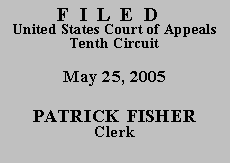

| KEVIN LEE PECHT,
v.
STATE OF UTAH |
No. 04-4168
(D.C. No. 2:02-CV-1231-DB) (Utah) |
A jury convicted Mr. Pecht on two counts of sodomy upon a child and one count of aggravated sexual abuse of a child, under Utah state law. Mr. Pecht was sentenced to ten years to life imprisonment on each sodomy conviction, and five years to life on the aggravated sexual abuse conviction. On direct appeal he raised several issues not presented at trial, including whether the trial court erred by allowing into evidence videotaped statements made by the victim's brother. State v. Pecht, 48 P.3d 931, 936 (Utah 2002). The Utah Supreme Court ruled that although admitting the evidence constituted error that was plain, the error was harmless because nearly all of the information in the videotape was also presented in trial testimony. Id. at 939. The court also held that Mr. Pecht's constitutional right to confront witnesses was not violated because both the victim and her brother testified and were cross-examined. Id. at 939-40.
Mr. Pecht sought habeas relief, asserting inter alia violation of his due process rights by the admission of the videotape and by the Utah Supreme Court's conclusion that the admission was harmless.(2) The district court denied relief because Mr. Pecht failed to raise the due process claim in state court and it was thus unexhausted. It also held his claim procedurally defaulted because it could have been raised in state court and was therefore now procedurally barred under state law. See Utah Code Ann. § 78-35a-106(1)(c). Mr. Pecht did not assert cause and prejudice or a fundamental miscarriage of justice to excuse this procedural default. See Thomas v. Gibson, 218 F.3d 1213, 1221 (10th Cir. 2000). In support of his current application for COA, Mr. Pecht reasserts his due process argument.
Issuance of a COA is jurisdictional. Miller-El v. Cockrell, 537 U.S. 322, 336 (2003). A COA can issue only "if the applicant has made a substantial showing of the denial of a constitutional right." 28 U.S.C. § 2253(c)(2). "A petitioner satisfies this standard by demonstrating that jurists of reason could disagree with the district court's resolution of his constitutional claims or that jurists could conclude the issues presented are adequate to deserve encouragement to proceed further." Miller-El, 537 U.S. at 327. When a district court has dismissed a habeas petition on procedural grounds, a prisoner must also show that "jurists of reason would find it debatable whether the district court was correct in its procedural ruling." Slack v. McDaniel, 529 U.S. 473, 484 (2000). "The COA determination under § 2253(c) requires an overview of the claims in the habeas petition and a general assessment of their merits." Miller-El, 537 U.S. at 336. "This threshold inquiry does not require full consideration of the factual or legal bases adduced in support of the claims. In fact, the statute forbids it." Id. While Mr. Pecht, in applying for a COA, is not required to prove the merits of his case, he must demonstrate "something more than the absence of frivolity or the existence of mere good faith on his or her part." Id. at 338 (internal quotations and citation omitted).
With these principles in mind, we have carefully reviewed the record of these proceedings and the well reasoned and detailed order of the district court. We conclude that reasonable jurists would not debate the resolution of the constitutional claims presented nor the district court's procedural ruling. We therefore DENY Mr. Pecht's request for COA and his motion to proceed ifp.
ENTERED FOR THE COURT
Stephanie K. Seymour
Circuit Judge
*.We liberally construe Mr. Pecht's pro se application. See Hall v. Scott, 292 F.3d 1264, 1266 (10th Cir. 2002).
2.Although the district court addressed other issues, Mr. Pecht has not asserted that the court erred in its resolution of them. Those issues are therefore waived. United States v. Abdenbi, 361 F.3d 1282, 1289 (10th Cir. 2004).